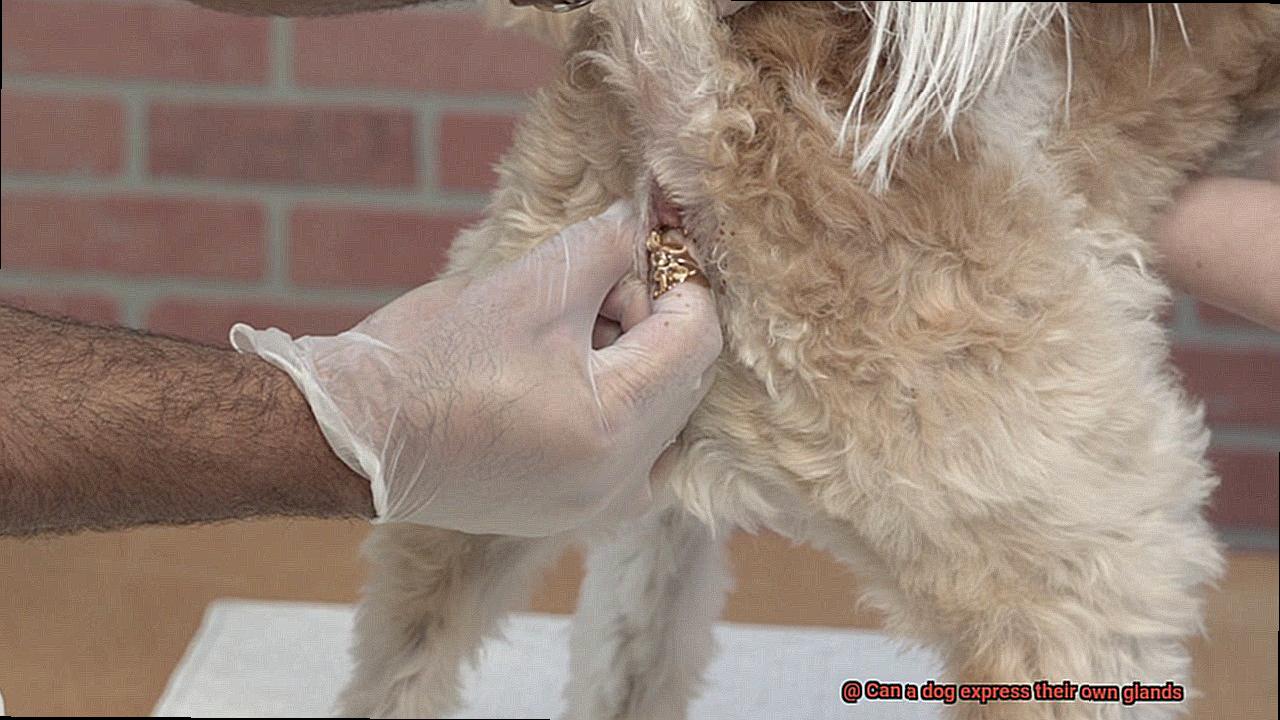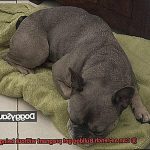Can a dog express their own glands?
Picture this: you’re snuggled up with your furry pal, enjoying some quality time together, when suddenly, an unpleasant odor wafts through the air. You wrinkle your nose and wonder, “What’s that smell?” Well, my friend, the answer might just lie in a secret talent possessed by our four-legged companions – the ability to express their own glands.
Glands may be tiny and inconspicuous, but they play a crucial role in a dog’s overall health and happiness. These little sacs produce fluids containing pheromones, oils, and other substances that help dogs communicate with each other and navigate their social world.
Traditionally, it was believed that only veterinarians could assist in expressing these glands during grooming sessions. But recent studies suggest that dogs themselves may have some autonomy in this matter – an evolutionary adaptation that aids in their communication and scent-marking.
While grooming certainly helps manage excessive glandular secretion, it’s fascinating to consider the possibility that dogs can take matters into their own paws when necessary. In this blog post, we’ll dive deep into how dogs might express their own glands and reveal some telltale signs you should keep an eye out for.
So grab a cup of joe and join us on this captivating journey into canine gland expression. Together, we’ll explore both casual observations and expert insights to unravel this intriguing topic.
- Body: [Proceed to discuss various ways dogs can express their own glands, such as scooting or rubbing against surfaces. Include references to professional opinions and studies.]
- Conclusion: [Summarize key points covered in the body of the blog post, emphasizing the importance of understanding and managing glandular secretions for your dog’s well-being. Encourage readers to stay tuned for practical tips in upcoming posts.]
Can a dog express their own glands
Contents
- 1 Can a dog express their own glands
- 2 What Are Anal Glands and How Do They Work?
- 3 Do Dogs Express Their Anal Glands Naturally?
- 4 Common Signs of Anal Gland Problems in Dogs
- 5 When Is It Necessary to Manually Express a Dog’s Anal Glands?
- 6 How to Properly Manually Express a Dog’s Anal Glands
- 7 Preventing Issues with Anal Glands in Dogs
- 8 The Role of Grooming and Hygiene Practices in Preventing Anal Gland Problems
- 9 Conclusion
Anal glands are small sacs located on either side of a dog’s anus that secrete a strong-smelling fluid. In this article, we’ll explore the topic and provide helpful information for French Bulldog owners.
Understanding Anal Glands:
Anal glands are an important part of a dog’s communication system. They release a unique scent that can convey information to other dogs about territory, health, and emotions. While most dogs naturally express their anal glands during specific situations, such as marking territory or defecating, some dogs may require assistance.
Signs of Gland Issues:
It’s essential for dog owners to be aware of the signs that their French Bulldog may be experiencing problems with their anal glands. These signs include scooting along the ground, excessive licking or biting at the anal area, and a foul-smelling odor coming from the rear end. If you notice any of these signs, it’s crucial to take action to prevent discomfort and potential health issues.
Assisting Your French Bulldog:
If your French Bulldog is unable to express their anal glands naturally, there are steps you can take to help them. Manual expression is one option, but it should only be done by someone trained in the procedure to avoid causing harm to your dog. Alternatively, you can seek assistance from a veterinarian or professional groomer who can safely and effectively express the glands.
Prevention and Maintenance:
To promote optimal gland function in your French Bulldog, it’s important to incorporate regular grooming and a healthy diet into their routine. Regular grooming helps keep the anal area clean and reduces the risk of impaction or infection. A high-fiber diet can also promote healthy bowel movements, which facilitates natural gland expression.
What Are Anal Glands and How Do They Work?
As an expert in the field, let me break it down for you in a way that’s easy to understand.
Anal glands, also known as anal sacs, are small glands located on either side of your French Bulldog’s anus. These glands play a role in communication and marking territory. When your Frenchie defecates, the pressure on the glands causes them to release a pungent-smelling fluid that contains various chemicals unique to each individual dog. It’s like their own personal signature scent.
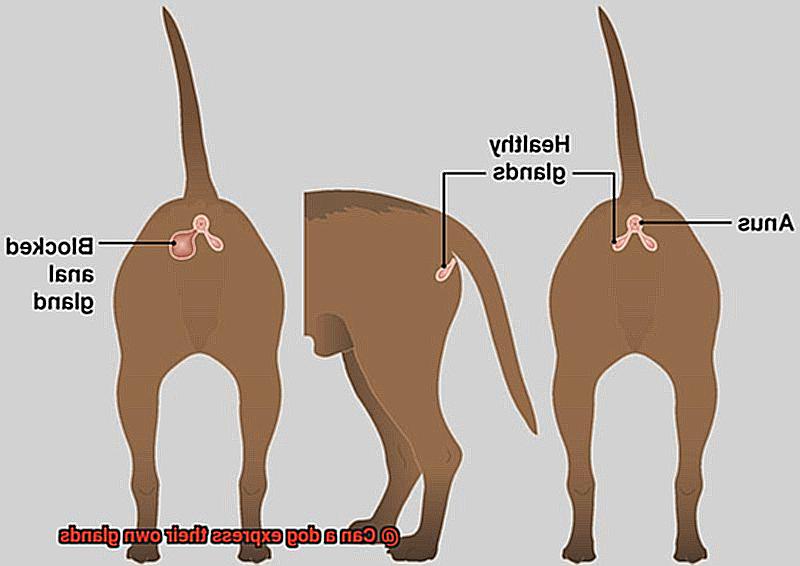
Now, I know what you’re thinking – why would dogs need to communicate through their rear end? Well, this odor serves as a form of communication among dogs, providing information about their gender, age, health status, and even their emotional state. It’s like leaving a calling card for other pups to decipher.
The anal gland fluid is often compared to the scent of rotten fish or feces. Trust me, it’s not the most pleasant smell in the world. But hey, dogs seem to love it. And it’s all part of their natural instincts.
So how do these anal glands actually work? Well, the glands are lined with specialized cells that produce the fluid. This fluid is then stored in the glands until it needs to be released – usually during a bowel movement. As your Frenchie poops, the muscles surrounding the glands contract and push out the fluid along with the stool. It’s nature’s way of keeping things flowing smoothly.
However, sometimes dogs can have difficulty expressing their own anal glands naturally. This can happen due to various reasons such as insufficient muscle tone or blockage of the ducts leading from the glands to the anus. When this happens, your French Bulldog may experience discomfort or even pain.
So what signs should you watch out for? If your Frenchie starts scooting their bottom along the ground, excessively licking or biting at their rear end, or if you notice a foul-smelling discharge, it could be a sign of anal gland issues. In these cases, it’s best to seek help from a trained professional or a veterinarian who can manually express the anal glands.
Remember, attempting to do it at home without proper knowledge and technique can cause injury or infection. So leave it to the experts.
Regular check-ups with your veterinarian can also help identify any underlying issues with the anal glands and ensure proper care and maintenance to prevent complications. It’s always better to be safe than sorry.
Do Dogs Express Their Anal Glands Naturally?
So, let’s dive into the question: do dogs express their anal glands naturally?
The answer is both yes and no. Dogs have two small glands located on either side of their anus called anal glands. These little guys produce a strong-smelling fluid that is unique to each dog and serves as a form of communication. In some cases, dogs are able to naturally express their anal glands while defecating or through normal bodily movements. It’s like their own little party trick.
However, not all dogs are able to effectively do this on their own, and that’s when problems can arise. Certain breeds, such as our beloved French Bulldogs, are more prone to anal gland issues due to their anatomy and genetics. These dogs may struggle to naturally express their anal glands, leading to discomfort, pain, and even infection.
So, how can you tell if your furry friend is having trouble with their anal glands? Look out for signs like scooting their rear end on the ground (a classic move), excessive licking of the area, and a not-so-pleasant odor. If you notice any of these signs, it’s time to take action.
Regular grooming and check-ups with your veterinarian are crucial for keeping an eye on your dog’s anal gland health. Your groomer or vet can manually express the anal glands if necessary, providing relief for your pup and preventing any potential complications.
Remember, it’s important to be proactive when it comes to your dog’s anal gland health. Don’t wait until there’s a problem – stay on top of regular grooming and keep an eye out for any signs of discomfort or odor coming from the rear end.
So, while dogs can sometimes naturally express their anal glands, it’s not always the case. As responsible dog owners, it’s our job to ensure our furry friends stay happy and healthy, even in the realm of anal glands. Stay vigilant, keep an eye out for any signs of trouble, and don’t be afraid to seek professional help when needed.
Common Signs of Anal Gland Problems in Dogs
French Bulldogs are beloved for their adorable wrinkled faces and playful nature. However, they are also prone to certain health issues, including anal gland problems. These small sacs located on either side of a dog’s anus are responsible for producing a unique scent that helps them mark their territory.
Unfortunately, these glands can sometimes become impacted or infected, leading to discomfort and potential complications. In this article, we will explore the common signs of anal gland problems in French Bulldogs, helping you better understand and address this issue.
Scooting or dragging their rear end:
One unmistakable sign of anal gland problems is when your French Bulldog starts scooting or dragging their rear end along the ground. This behavior is an instinctual attempt to relieve the discomfort caused by impacted or infected glands.
Excessive licking or biting of the anal area:
If you notice your French Bulldog constantly licking or biting at their rear end, it may be a sign of anal gland problems. They do this in an effort to alleviate the discomfort and irritation.
Foul odor:
An unpleasant smell emanating from your French Bulldog’s rear end is often an indicator of anal gland problems. When the glands become impacted or infected, they release a strong and pungent odor.
Swelling or redness around the anal area:
Inflamed or irritated skin around the anus is another telltale sign of anal gland problems. The area may appear swollen, red, or even painful due to pressure or infection.
Difficulty defecating:
French Bulldogs with anal gland problems may experience difficulty during bowel movements. They may strain, have small firm stools, or show signs of discomfort due to the pressure on the glands.
Pain or discomfort when sitting or squatting:
If your French Bulldog shows signs of pain or discomfort when sitting or squatting, it could be a result of inflammation or infection in the anal glands. They may appear restless or have difficulty finding a comfortable position.
Abscesses or cysts:
In severe cases, French Bulldogs with untreated anal gland problems may develop abscesses or cysts around the anal area. These can be painful and require immediate veterinary attention.
When Is It Necessary to Manually Express a Dog’s Anal Glands?
One common problem that many French Bulldogs face is anal gland issues. These small sacs located on either side of their anus can cause discomfort and even pain if not properly taken care of. In this article, we will discuss when it is necessary to manually express your French Bulldog’s anal glands and how to do it safely.
Why Do French Bulldogs Need Their Anal Glands Expressed?
French Bulldogs, with their unique anatomy, often have smaller anal gland ducts that are more prone to blockages. Additionally, dogs with allergies or gastrointestinal disorders may also be more susceptible to anal gland problems.
When a dog’s anal glands become impacted or infected, it can cause discomfort, swelling, and even pain for the dog. Some common signs that your French Bulldog may need their anal glands expressed include scooting on the floor, excessive licking or biting of the anal area, and signs of pain or discomfort when sitting or defecating.
When Should You Consult a Veterinarian?
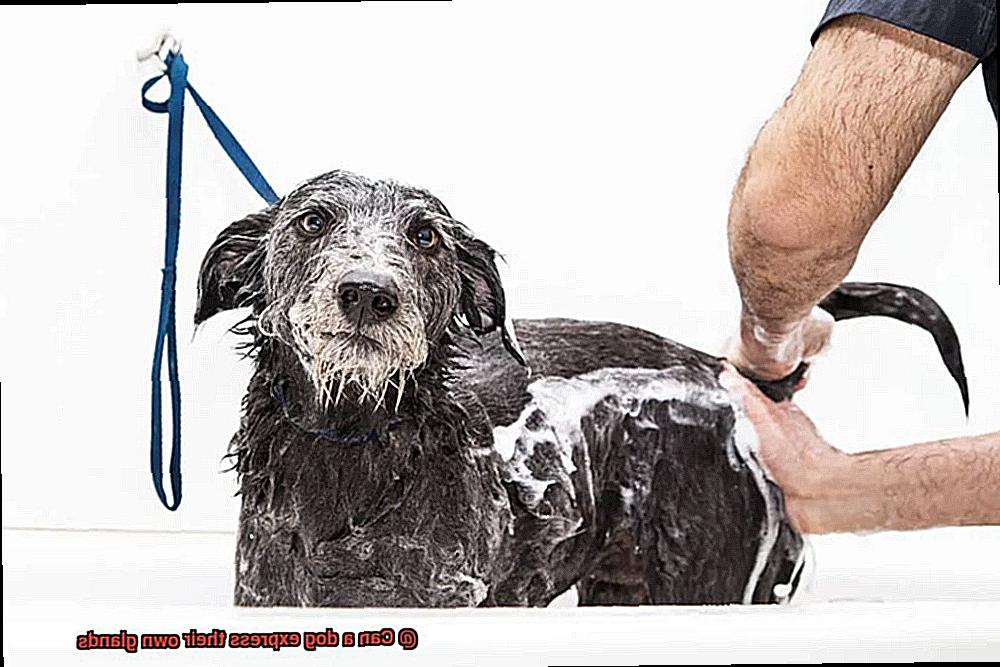
If you notice any signs of anal gland problems in your French Bulldog, it is crucial to consult with a veterinarian. They will be able to assess the situation and determine if manual expression is necessary. It’s important to note that attempting to express the anal glands at home without proper knowledge or technique can cause harm to your dog and may worsen the situation. Trusting a trained professional or working under veterinary supervision is key.
How Can You Prevent Anal Gland Issues in Your French Bulldog?
While some dogs are more prone to anal gland problems than others, there are steps you can take to help prevent these issues from occurring in your French Bulldog. Regular veterinary check-ups are essential for catching any potential problems early on. Additionally, maintaining a healthy diet and lifestyle for your dog can also help prevent anal gland issues. Proper nutrition and exercise can promote regular bowel movements, which can aid in the natural expression of the anal glands.
How to Properly Manually Express a Dog’s Anal Glands
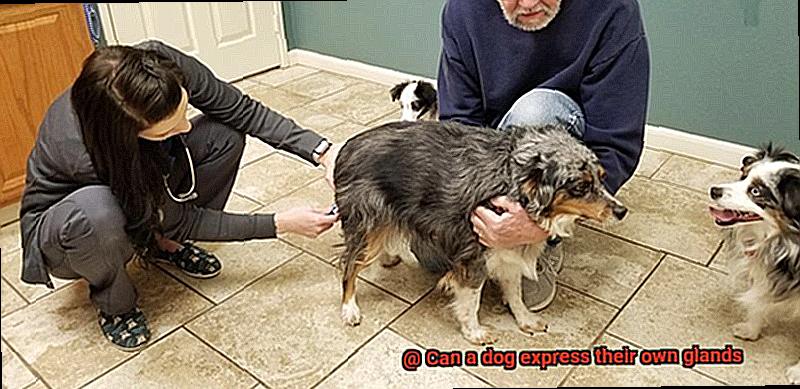
French Bulldogs are adorable and playful companions, but just like any other dog breed, they can experience issues with their anal glands. Knowing how to properly manually express your French Bulldog’s anal glands can help prevent discomfort and potential health problems. In this blog post, we will guide you through the steps to ensure a happy and healthy pup.
Step 1: Gather the necessary supplies
Before you begin, make sure you have latex gloves, clean towels or wipes, and a water-based lubricant. These supplies will make the process easier and more hygienic for both you and your furry friend.
Step 2: Position your French Bulldog comfortably
Find a quiet space where your French Bulldog can relax. Gently restrain your pup by sitting or standing near them, and have someone assist you if needed. It’s important to ensure your dog feels safe and secure during the process.
Step 3: Locate the anal glands
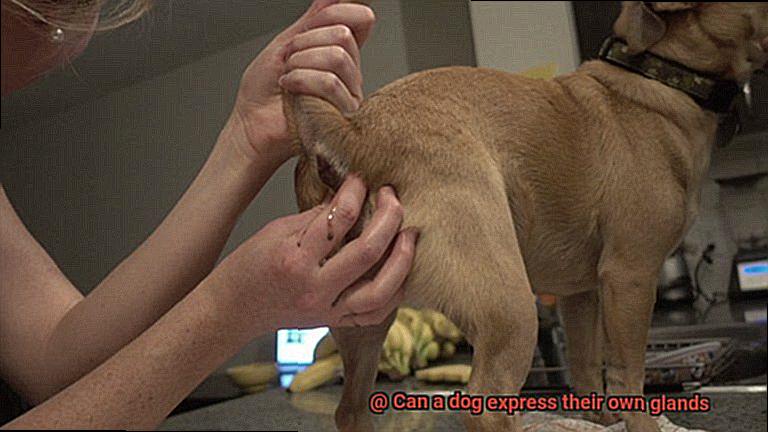
With gloves on, gently feel around your French Bulldog’s anus for two small pea-sized bumps on either side. These are the anal glands. Apply gentle pressure to ensure you’re in the right spot.
Step 4: Apply gentle pressure to express the glands
Using your thumb and index finger or a clean tissue, apply gentle inward and upward pressure towards the anus. Remember to be gentle and avoid squeezing too hard, as this can cause discomfort or injury to your pup.
Step 5: Observe the fluid and clean the area
As you apply pressure, observe the color and consistency of the fluid released. Normal anal gland fluid should be pale yellow or brownish in color with a slightly thick consistency. After expressing the glands, use a clean towel or wipes to gently clean the area around the anus.
Step 6: Repeat as needed and seek professional help if necessary
It’s recommended to manually express your French Bulldog’s anal glands every 4-6 weeks or as needed. However, if your pup continues to experience discomfort or recurring issues, it’s best to consult with a veterinarian for further evaluation and potential treatment options.
Preventing Issues with Anal Glands in Dogs
French Bulldogs are known for their charming personalities and adorable snorts, but did you know that they are also prone to issues with their anal glands? These small glands located on either side of their anus can become impacted or infected if not properly cared for.
With a little knowledge and some preventive measures, you can keep your furry friend’s anal glands in tip-top shape.
Regular Grooming and Hygiene
One of the best ways to prevent anal gland problems in French Bulldogs is by maintaining good grooming and hygiene practices. Keep the area around their anus clean and dry to prevent bacterial growth. Regularly bathe and groom your Frenchie to ensure that their coat is clean and free from dirt or debris that could potentially clog their glands.
High-Fiber Diet
A healthy diet plays a crucial role in preventing constipation and promoting regular bowel movements, which can help prevent issues with anal glands. Make sure to feed your French Bulldog a high-quality dog food that is rich in fiber. Additionally, you can add fiber-rich foods like pumpkin or psyllium husk to their diet as a natural way to promote healthy digestion.
Regular Veterinary Check-ups
Just like humans, dogs need regular check-ups to monitor their overall health, including their anal glands. During routine visits, your veterinarian can manually express your Frenchie’s glands if necessary and provide guidance on proper care and prevention of issues. They can also identify any potential problems early on before they develop into more serious conditions.
Recognize the Signs
It’s important for French Bulldog owners to be aware of the signs of anal gland problems in their pets. If you notice your Frenchie scooting or dragging their rear end on the ground, excessive licking or biting at the area, foul odor, swelling or redness around the anus, or signs of discomfort or pain, it’s time to seek veterinary attention. Prompt intervention can prevent further complications and keep your Frenchie comfortable.
The Role of Grooming and Hygiene Practices in Preventing Anal Gland Problems
We all know that our quirky little friends bring us endless joy and laughter. But let’s get real for a moment – have you ever dealt with those dreaded anal gland problems? In this blog post, we’ll dive into the importance of grooming and hygiene practices in preventing these pesky issues.
Regular Grooming: The Key to a Happy Booty
Regular grooming is the secret sauce to maintaining your Frenchie’s anal gland health. Here’s what you need to know:
- Brushing – A gentle brush through your Frenchie’s coat not only keeps them looking fabulous but also prevents matting, which can put pressure on the anal glands.
- Bathing – Keep your pooch squeaky clean. Regular baths with mild, dog-friendly shampoos help reduce inflammation and infection risks in those sensitive glands.
- Fur Trimming – Tidy up that booty. Trim the fur around their anal area to minimize debris buildup and potential blockage.
Hygiene Habits that Make a Difference
Good hygiene practices go beyond just grooming. Here’s how you can maintain a clean environment for your furry friend:
- Clean Living Space – Regularly clean your Frenchie’s bedding and eliminate any potential sources of bacteria or parasites to prevent contamination.
- Poo Patrol – Keep those outdoor spaces clean. Regularly scoop up after your pup to avoid any bacterial transfer to their anal glands.
The Ins and Outs of Anal Gland Checks
Inspecting your Frenchie’s anal area should be part of your grooming routine. Here’s what to look out for:
- Lift That Tail – Gently lift the tail during grooming sessions to check for any signs of swelling, redness, discharge, or odor.
- Veterinarian Consultation – If you notice any abnormalities, don’t hesitate to consult your vet for further examination and treatment.
- Professional Grooming – Some Frenchies may require professional grooming services for proper cleaning and expression of their anal glands.
Closing Thoughts:
Remember, prevention is key. By implementing regular grooming and hygiene practices, you can keep your French Bulldog’s anal glands healthy and happy. So, grab that brush, lather up the shampoo, and let’s keep those tails wagging.
Nh6vigjgdpQ” >
Conclusion
In conclusion, it is not advisable for a dog to attempt to express their own glands.
This task should be left to professionals, such as veterinarians or groomers, who have the necessary expertise and experience. Trying to do it yourself can lead to injury or infection for both you and your furry companion.
It’s essential to prioritize your dog’s well-being and seek professional help when needed.
